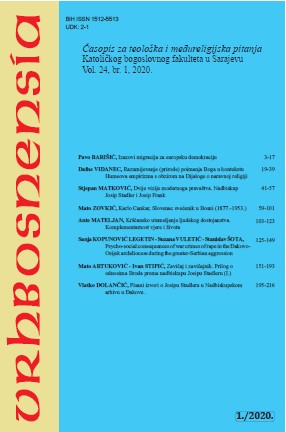KARLO CANKAR, SLOVENAC SVEĆENIK U BOSNI (1877.-1953.)
KARLO CANKAR, AN ETHNIC SLOVENE AND PRIEST IN BOSNIA (1877-1953)
Author(s): Mato ZovkićContributor(s): Kevin Sullivan (Translator)
Subject(s): Christian Theology and Religion, Media studies, History of Church(es), Pre-WW I & WW I (1900 -1919), Interwar Period (1920 - 1939), Sociology of Religion
Published by: Katolički bogoslovni fakultet
Keywords: Karlo Cankar; Archbishop Stadler; just state; Archbishop Šarić; Croatian Catholic Movement; crusaders; literacy of Catholics in rural parishes;
Summary/Abstract: In Slovenia Karlo Cankar is known for having been younger brother of the country’s most celebrated writer Ivan Cankar. Karlo hosted his brother in Sarajevo for six months in 1909 and during that time Ivan wrote his play, Hlapci (Serfs). Karlo preserved Ivan’s letters, which were published in three volumes in Ljubljana 1948 by their cousin dr. Izidor Cankar. Karlo was a seminarian of Ljubljana diocese in 1901 when he decided to continue his theological studies in Sarajevo as a candidate for the priesthood of Sarajevo Archdiocese. He was ordained in 1903 and performed different ministries in Sarajevo from 1904 to 1929. He supported the view of Archbishop Josip Stadler that Croats and Slovenes could have a prosperous future within the Austrian-Hungarian monarchy if the monarchy granted them more ethnic and cultural rights. This is why Stadler entrusted him with the office of editor-in-chief of Hrvatski Dnevnik (1906-1918), a daily political newspaper desigebnd to inform Catholic Croats of Bosnia and Herzegovina about Catholic social thought and activity. Stadler’s successor, Ivan Šarić, named Cankar a canon of Vrhbosna-Sarajevo chapter in 1923 and asked him to assume the task of editor-in-chief of Katolički Tjednik, the weekly Magazine for Croat Catholics in Bosnia. In his essays, Cankar highlighted the scandalous abuses of Vojo Janjić, Minister for Religions in the Kingdom of Serbs, Croats and Slovenes and of other Serb state employees who behaved as if the new state of the South Slavs were simply an enlargement of the Kingdom of Serbia. In this period, canons received their salaries from the state budget, and Vojo Janjić punished Cankar by withdrawing his salary. In 1926 Fr. Dragutin Kamber wrote an article in Katolički Tjednik announcing his intention to transform this weekly into an organ of Catholic Action, inspired by the Bosnian view of this lay apostolate movement that emerged from the 1922 encyclical of Pope Pius XI Ubi Arcano Dei. Cankar supported the role of the lay apostolate as proposed by Zagreb supporters of the movement. Since Archbishop Šarić took the side of Fr. Kamber, Cankar resigned from editing the Katolički tjednik and writing for it. On 24 September 1929 Cankar was named parish priest of Lukavac and dean of Tuzla deanery. In October 1937 he resigned from pastoral ministry due to his health and was given accommodation in “Egypt”, an orphanage and elementary school for poor children run by the Servants of the Infant Jesus in Sarajevo. In 1949 the communist regime confiscated all schools run by Catholic nuns in Sarajevo. Thanks to the mediation of his cousin, dr. Izidor Cankar, who was a public figure in Ljubljana, Karlo moved in 1949 to the Franciscan Convent in Ljubljana where he finished his earthly journey on 9 February 1953. Together with Anton Jeglič, a Slovenian priest who was a canon in Sarajevo for sixteen years in the late 19th century and bishop of Ljubljana from 1898 to 1930, Karlo Cankar affirmed the friendly relations of Croat Catholics and Slovenes. This friendship was confirmed by bl. Aloysius Stepinac, Archbishop of Zagreb who provided acceptance and pastoral assignment for 534 Slovene priests driven from their parishes or religious communities by the pro-Nazi regime during World War Two.
Journal: Vrhbosnensia
- Issue Year: 2020
- Issue No: 1
- Page Range: 59-101
- Page Count: 43
- Language: Croatian

